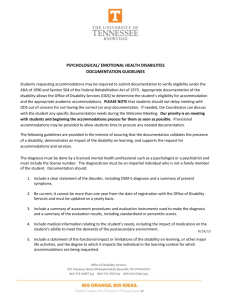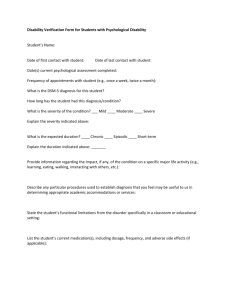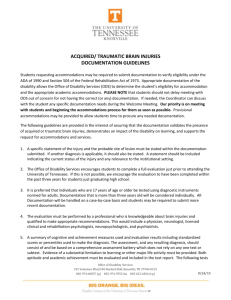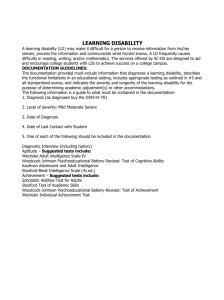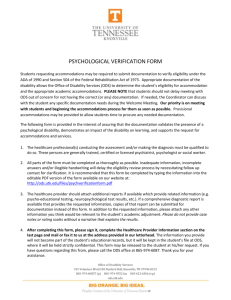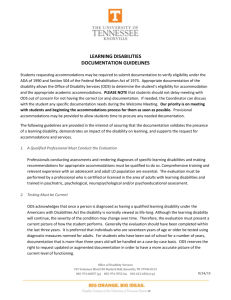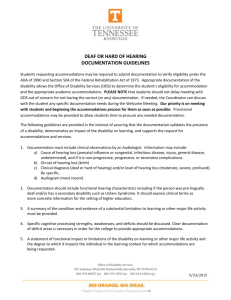Word - Office of Disability Services
advertisement
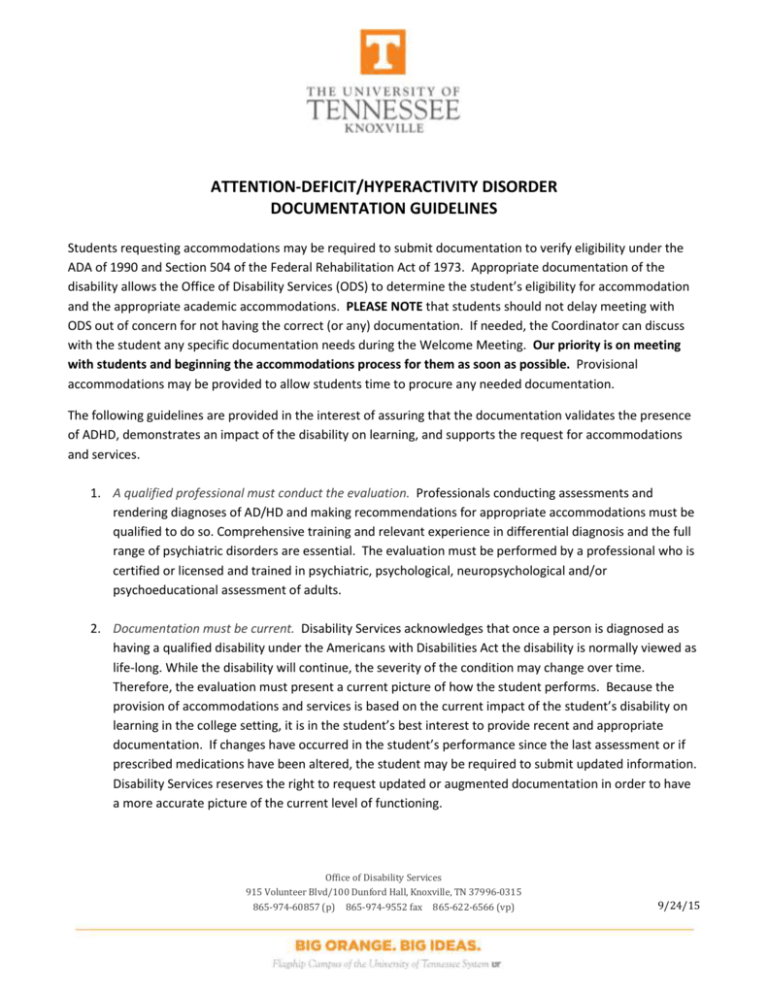
ATTENTION-DEFICIT/HYPERACTIVITY DISORDER DOCUMENTATION GUIDELINES Students requesting accommodations may be required to submit documentation to verify eligibility under the ADA of 1990 and Section 504 of the Federal Rehabilitation Act of 1973. Appropriate documentation of the disability allows the Office of Disability Services (ODS) to determine the student’s eligibility for accommodation and the appropriate academic accommodations. PLEASE NOTE that students should not delay meeting with ODS out of concern for not having the correct (or any) documentation. If needed, the Coordinator can discuss with the student any specific documentation needs during the Welcome Meeting. Our priority is on meeting with students and beginning the accommodations process for them as soon as possible. Provisional accommodations may be provided to allow students time to procure any needed documentation. The following guidelines are provided in the interest of assuring that the documentation validates the presence of ADHD, demonstrates an impact of the disability on learning, and supports the request for accommodations and services. 1. A qualified professional must conduct the evaluation. Professionals conducting assessments and rendering diagnoses of AD/HD and making recommendations for appropriate accommodations must be qualified to do so. Comprehensive training and relevant experience in differential diagnosis and the full range of psychiatric disorders are essential. The evaluation must be performed by a professional who is certified or licensed and trained in psychiatric, psychological, neuropsychological and/or psychoeducational assessment of adults. 2. Documentation must be current. Disability Services acknowledges that once a person is diagnosed as having a qualified disability under the Americans with Disabilities Act the disability is normally viewed as life-long. While the disability will continue, the severity of the condition may change over time. Therefore, the evaluation must present a current picture of how the student performs. Because the provision of accommodations and services is based on the current impact of the student’s disability on learning in the college setting, it is in the student’s best interest to provide recent and appropriate documentation. If changes have occurred in the student’s performance since the last assessment or if prescribed medications have been altered, the student may be required to submit updated information. Disability Services reserves the right to request updated or augmented documentation in order to have a more accurate picture of the current level of functioning. Office of Disability Services 915 Volunteer Blvd/100 Dunford Hall, Knoxville, TN 37996-0315 865-974-60857 (p) 865-974-9552 fax 865-622-6566 (vp) ods.utk.edu 9/24/15 3. Documentation must be comprehensive. a) Evidence of early impairment: Because ADHD is, by definition in the DSM-5 (Diagnostic and Statistical Manual of Mental Disorders, Fifth Edition), first exhibited in childhood (although it may not have been formally diagnosed) and manifests itself in more than one setting, relevant historical information is essential. The following should be included in a comprehensive assessment: clinical summary of objective historical information, establishing symptomology indicative of ADHD throughout childhood, adolescence, and adulthood as garnered from transcripts, report cards, teacher comments, tutoring evaluations, and past psycho-educational testing; and third party interviews when available. b) Evidence of current impairment: According to the DSM-5, Attention Deficit/Hyperactivity Disorder (ADHD) is a persistent pattern of inattention and/or hyperactivity or impulsivity which is more frequent and severe than is typically observed among individuals at a comparable level of development. The DSM-5 delineates three types, including the type primarily characterized by inattention, the type primarily characterized by hyperactivity-impulsivity, or the combined type in which symptoms of both inattention and hyperactivity-impulsivity are present. 4. Documentation must include a diagnostic interview. An evaluation report should include the summary of a comprehensive diagnostic interview by a qualified evaluator. It should include a summary and description of the presenting problem(s); developmental history; relevant medical history, including the absence of a medical basis for the present symptoms; academic history; relevant family history; relevant psychosocial history; a discussion of dual diagnosis, alternative or co-existing mood, behavioral, neurological, and/or personality disorders along with any history of relevant medication use that may affect the individual's learning. 5. Documentation must include assessment measures. The diagnosis of AD/HD is strongly dependent on the clinical interview in conjunction with a variety of formal and informal measures. Since there is no one test, or specified combination of tests, for determining ADHD, the diagnosis of an attention deficit/hyperactivity disorder (AD/HD) requires a multifaceted approach. Any tests that are selected by the evaluator should be technically accurate, reliable, valid, and standardized on the appropriate norm group. When diagnosing AD/HD, in addition to a clinical interview, rating scales which quantify the nature of the impairment such as the Wender Utah, Brown Attention-Activation Disorder Scale, Beck Anxiety Inventory, Hamilton’s Depression Rating Scale, Conners Teacher and Parent Rating Scale should also be included, in conjunction with other data. 6. Documentation must include both aptitude and academic achievement evaluations. Aptitude and achievement profiles may suggest attention or information processing deficits. The diagnosis can also include a diagnosis of the co-existence for a specific learning disability. Assessment, and any resulting diagnosis of a learning disability, should consist of and be based on a comprehensive assessment battery which does not rely on any one test or subtest. Average broad cognitive functioning must be demonstrated on an individually administered intelligence test. Quantitative and qualitative 9/24/15 information which supports the diagnosis, including all subscale and subtest scores, should be listed. Objective evidence of a substantial limitation to learning must be provided. Each of the following should be provided: a) Aptitude: A complete intellectual assessment with all subtests and standard scores reported is essential. Examples are the WAIS-III, Stanford-Binet IV, and Woodcock-Johnson Psychoeducational Battery: Test of Cognitive Ability. b) Academic Achievement: A comprehensive academic achievement battery is essential, with all subtests and standard scores reported for those subtests administered. The battery must include current levels of academic functioning in relevant areas such as reading (decoding and comprehension), mathematics, and oral and written language. Examples are WoodcockPsychoeducational Battery III: Test of Achievement, Weschler Individual Achievement Test (WAIT), Stanford Test of Academic Skills (TASK), and Scholastic Abilities Test for Adults (SATA). c) Information Processing: Specific cognitive processing strengths, weaknesses and deficits should be discussed, such as visual spatial abilities, memory, fine motor/dexterity, executive functions (verbal/nonverbal reasoning), selective attention/perception (auditory/visual), and oral language skills. 7. Documentation should include an informal assessment. Social-emotional assessment is helpful in order to rule-out a primary emotional basis for learning difficulties. Social-emotional status should be assessed and discussed. If applicable, a mental health diagnosis should be clearly stated. Colleges need to know differential diagnosis of psychological disorders that impact upon academics from learning disabilities. College is typically quite stressful for students who have disabilities. In an attempt to better serve students, it is helpful to know about their personality characteristics, psychological welfare, selfesteem and ability to respond to stress. 8. Documentation must include an interpretative summary. A well-written interpretative summary based on a comprehensive evaluative process is a necessary component of the documentation. Because ADHD is in many ways a diagnosis that is based upon the interpretation of historical data and observation, as well as other diagnostic information, it is essential that professional judgment be utilized in the development of a summary, which must include: a) Demonstration of the evaluator's having ruled out alternative explanations for inattentiveness, impulsivity, and/or hyperactivity as a result of psychological or medical disorders or non-cognitive factors b) Indication of how patterns of inattentiveness, impulsivity, and/or hyperactivity across the life span and across settings are used to determine the presence of AD/HD c) Indication of whether or not the candidate was evaluated while on medication, and whether or not the prescribed treatment produced a positive response d) Indication and discussion of the substantial limitation to learning presented by the AD/HD and the degree to which it affects the individual in a higher education setting 9/24/15 e) Indication as to why specific accommodations are needed and how the effects of AD/HD symptoms, as designated by the DSM-5, are mediated by the accommodations 9. All documentation must include the following: a) Names of assessment instruments used and dates of testing. b) Quantitative and qualitative information which supports the diagnosis, including subtest scores. c) The areas of educational impact and the severity of the condition. d) Previous history of the disability and verification of any previous testing. e) Recommendations for prescriptive treatments. f) Notation of medications prescribed, if any, and potential impact on learning. g) Additional observations or recommendations, which could assist us in adequately serving the student. h) The names, titles, addresses, phone numbers, state of license and license number of the evaluator(s). Please note that in reviewing the specific accommodation requested by the student or recommended by the physician/evaluator, ODS may find that while a recommendation is clinically supported, it is not the most appropriate accommodation given the requirements of a particular student’s academic program. In addition, ODS may also propose clinically supported accommodations that would be appropriate and useful for the student, but which neither the student nor the evaluator have requested. The aforementioned guidelines are provided so that ODS can respond appropriately to the individual needs of the student. ODS reserves the right to determine eligibility for services based on the quality of the submitted documentation. Documentation may need to be updated or augmented in order to be reviewed more fully. ALL DOCUMENTATION IS CONFIDENTIAL 9/24/15

